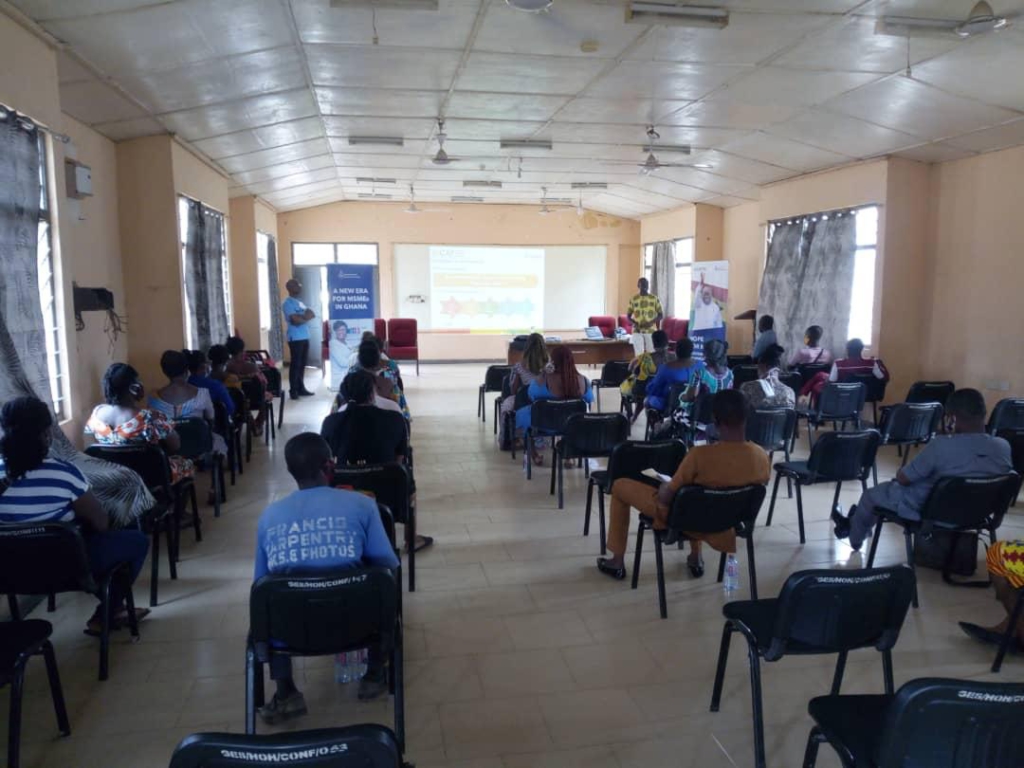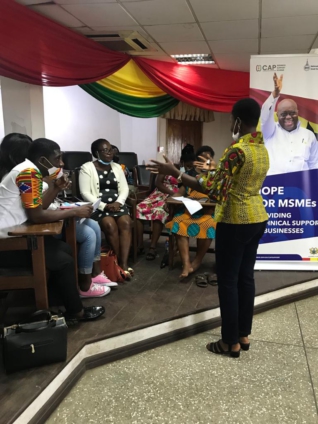The National Board for Small Scale Industries (NBSSI) as part of its mandate to support private businesses to recover from the effects of Covid-19 has organised an Entrepreneurship, Business Management and Financial Literacy training for Micro, Small and Medium Scale Enterprises (MSMEs).
The event which has been running since Monday, September 28, targets about 8,100 beneficiaries that received financial support under the Coronavirus Alleviation Programme Business Support Scheme (CAP BuSS) across the country.
The training exercise is expected to end on Saturday, October 31, 2020.
The ongoing training programme includes financial management, bookkeeping, basic accounting and formalization of businesses. It is hoped that these topics will contribute positively to the agenda of NBSSI to push for the formalization of MSMEs in Ghana.
The training programmes are being facilitated by representatives of NBSSI and professionals with experience in financial literacy and business formalization.
The initiative forms part of the technical support aspect of the Scheme being implemented by the NBSSI to assist beneficiaries of the CAP BuSS initiative to equip them with additional skills and knowledge to grow and sustain their business.
Since the inception of the Scheme, NBSSI made it known that the Scheme will not only focus on providing financial support to these beneficiaries but will be equally dedicated to ensuring that beneficiaries utilise the funds in order to grow and sustain their businesses which will motivate repayment.

The NBSSI has also indicated that its 185 offices are opened to assist MSMEs all year round.
While at it, the NBSSI has taken into consideration the necessary Covid-19 health protocols to ensure that participants are safe.
Provision has been made for Personal Protective Equipment (PPEs) including hand sanitizers, soaps, nose masks, water and veronica buckets. Social distancing is also being observed.
Why the CAP BuSS was set up
The CAP BuSS was instituted by the President, His Excellency Nana Addo Dankwa Akufo-Addo to provide support to MSMEs negatively impacted by the Coronavirus Pandemic.
In Ghana, MSMEs account for 92% of businesses and contribute to about 70% of Gross Domestic Product (ISSER, University of Ghana, 2015). Undoubtedly, MSMEs are the pulse of the Ghanaian economy. It is these businesses that keep the lights on in Ghana.
Currently, about 237,518 MSMEs have received disbursements from the Scheme. Beneficiaries include businesses in the manufacturing, health care and pharmaceutical, water and sanitation, textiles and garments, education and hospitality sectors.
Latest Stories
-
Personal and political interests disrupting power sector – IES
20 mins -
Kumasi to host Joy Prime’s Big Chef Tertiary S2 finals
31 mins -
KOD hints at releasing an album before he turns 50
37 mins -
2024 Election: NDC accuses NPP of printing fake ballot papers
44 mins -
A democracy that fails to solve its own problems is a questionable democracy – Dr Muhammad Suleiman
48 mins -
Our fight against corruption is more talk, less action – Mary Addah
55 mins -
CHRAJ report settles matters against Kusi Boateng – Lawyer
1 hour -
Growing dissatisfaction with democracy demands citizen-centered governance – Mavis Zupork Dome
1 hour -
Ghana’s Democracy: Choices, not elections will drive change – Benjamin Offei-Addo
1 hour -
PRESEC-Legon marks 86 years with launch of groundbreaking AI lab on November 30
1 hour -
Elsie Appeadu of Delft Imaging makes the list of 100 Most Influential People Awards 2024 recipients
1 hour -
Limited citizen participation threatens Ghana’s democracy – Prof. Kwesi Aning
1 hour -
Contractor storms basic school to drive out students from classroom, claiming government owes him
2 hours -
The quest for peaceful election: religious and traditional leaders should be part of election observers
2 hours -
NDC has better policies to boost economy through agricultural, oil sectors – Ato Forson
2 hours

